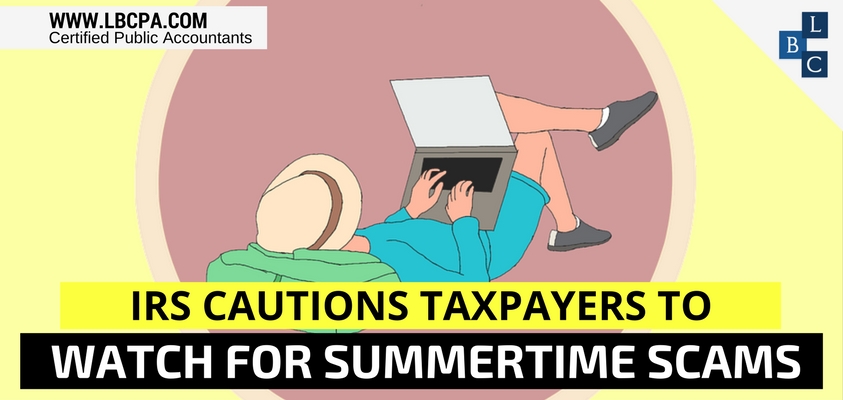LBCPA News 
Click here to go back
IRS Cautions Taxpayers to Watch for Summertime Scams

WASHINGTON – The Internal Revenue Service today issued a warning that tax-related scams continue across the nation even though the tax filing season has ended for most taxpayers. People should remain on alert to new and emerging schemes involving the tax system that continue to claim victims.
“We continue to urge people to watch out for new and evolving schemes this summer,” said IRS Commissioner John Koskinen. “Many of these are variations of a theme, involving fictitious tax bills and demands to pay by purchasing and transferring information involving a gift card or iTunes card. Taxpayers can avoid these and other tricky financial scams by taking a few minutes to review the tell-tale signs of these schemes.”
EFTPS Scam
A new scam which is linked to the Electronic Federal Tax Payment System (EFTPS) has been reported nationwide. In this ruse, con artists call to demand immediate tax payment. The caller claims to be from the IRS and says that two certified letters mailed to the taxpayer were returned as undeliverable. The scammer then threatens arrest if a payment is not made immediately by a specific prepaid debit card. Victims are told that the debit card is linked to the EFTPS when, in reality, it is controlled entirely by the scammer. Victims are warned not to talk to their tax preparer, attorney or the local IRS office until after the payment is made.
“Robo-call” Messages
The IRS does not call and leave prerecorded, urgent messages asking for a call back. In this tactic, scammers tell victims that if they do not call back, a warrant will be issued for their arrest. Those who do respond are told they must make immediate payment either by a specific prepaid debit card or by wire transfer.
Private Debt Collection Scams
The IRS recently began sending letters to a relatively small group of taxpayers whose overdue federal tax accounts are being assigned to one of four private-sector collection agencies. Taxpayers should be on the lookout for scammers posing as private collection firms. The IRS-authorized firms will only be calling about a tax debt the person has had – and has been aware of – for years. The IRS would have previously contacted taxpayers about their tax debt.
Scams Targeting People with Limited English Proficiency
Taxpayers with limited English proficiency have been recent targets of phone scams and email phishing schemes that continue to occur across the country. Con artists often approach victims in their native language, threaten them with deportation, police arrest and license revocation among other things. They tell their victims they owe the IRS money and must pay it promptly through a preloaded debit card, gift card or wire transfer. They may also leave “urgent” callback requests through phone “robo-calls” or via a phishing email.
Tell Tale Signs of a Scam:
The IRS (and its authorized private collection agencies) will never:
Call to demand immediate payment using a specific payment method such as a prepaid debit card, gift card or wire transfer. The IRS does not use these methods for tax payments. The IRS will usually first mail a bill to any taxpayer who owes taxes. All tax payments should only be made payable to the U.S. Treasury and checks should never be made payable to third parties.
Threaten to immediately bring in local police or other law-enforcement groups to have the taxpayer arrested for not paying.
Demand that taxes be paid without giving the taxpayer the opportunity to question or appeal the amount owed.
Ask for credit or debit card numbers over the phone.
For anyone who doesn’t owe taxes and has no reason to think they do:
Do not give out any information. Hang up immediately.
Contact the Treasury Inspector General for Tax Administration to report the call. Use their IRS Impersonation Scam Reporting web page. Alternatively, call 800-366-4484.
Report it to the Federal Trade Commission. Use the FTC Complaint Assistant on FTC.gov. Please add "IRS Telephone Scam" in the notes.
For anyone who owes tax or thinks they do:
View tax account information online at IRS.gov to see the actual amount you owe. Then review payment options.
Call the number on the billing notice, or
Call the IRS at 800-829-1040. IRS workers can help
How to Know It’s Really the IRS Calling or Knocking
The IRS initiates most contacts through regular mail delivered by the United States Postal Service. However, there are special circumstances in which the IRS will call or come to a home or business, such as:
when a taxpayer has an overdue tax bill,
to secure a delinquent tax return or a delinquent employment tax payment, or,
to tour a business as part of an audit or during criminal investigations.
Even then, taxpayers will generally first receive several letters (called “notices”) from the IRS in the mail. For more information, visit “How to know it’s really the IRS calling or knocking on your door” on IRS.gov.
If you have any questions regarding accounting, domestic taxation, international taxation, IRS representation, U.S. tax implications of Real Estate transactions or financial statements, please give us a call at 305-274-5811.
Source: IRS






